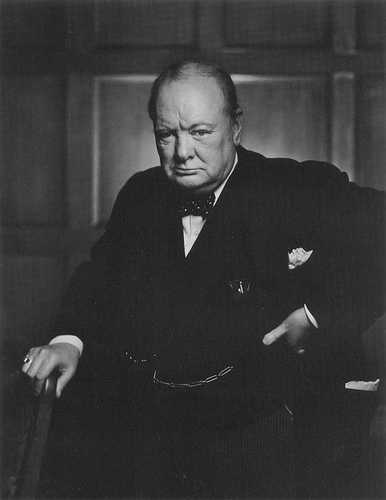| | Our Products: | | | | Angle Viewfinder VIDEOS | | | | | | | |
|
 |
Sorry, information not found |
|
|
|
|
|
|
 | | Saturday, December 20, 2008 | | Winston Churchill By Yousef Karsh | 
This photo, taken almost 90 years ago, remains one of the most famous portraits ever taken. The story goes that Karsh wanted Churchill to remove his cigar from his mouth but Churchill did not want to. Reaching forward to appear as if he was going to adjust Churchill's collar, Karsh suddenly pulled the cigar from Churchill's mouth and snapped the picture.
Cheeky fellow, that Karsh, considering WW2 was raging and Churchill was leader of the then world power, Great Britain. But the end result is truly a mesmerizing portrait.
Here's a question. From what angle did Karsh take the photo? Yes, from waist level. From where does an archer shoot his arrow? Eye level. From where does a deer hunter fire his rifle? Eye level. No wonder Clint Eastwood shot from the hip. Nobody saw it coming. They could not look away from those steely blue eyes! When the photographer holds a camera up to his face and points it at another person something happens, and in most cases it is not good. It often makes the subject uneasy. Maybe after some time he will relax, and overcome this intimidating lens pointing at him. Maybe not.
When you shoot from waist level, you can look face-to-face with your subject. There is no camera in the way. You can briefly look down to frame your subject then look up and carry on your conversation and fire away at just the right moment. Not to say there are not many amazing portraits taken from eye level, but shooting from the hip will in most cases be less intimidating for your subject.
Flipbac and relax. (Cheesy, I know, but it I could not resist).Send comments to: comments@flipbac.com
| |
| Thursday, December 18, 2008 | | Have your say. | Until we get the add comment / view comments options sorted out please send your comments to: comments@flipbac.comLet us know if you would like it to be posted. | |
| Sunday, December 14, 2008 | | Head games. |  Have you ever taken a painting and drawing class? Who has heard their instructor say ‘draw what you see and not what you think you see!’? After your first class you realize this is much easier said than done. Have you ever taken a painting and drawing class? Who has heard their instructor say ‘draw what you see and not what you think you see!’? After your first class you realize this is much easier said than done.
Many art students will draw a ‘still life’ that contains common items such as a
chair, a table, maybe some fruit, flowers etc. Here is when our mind
starts to deceive us - our minds already have pictures of tables,
chairs, fruit and flowers. As a novice we often start drawing the
images in our minds and not the objects in front of us. We don’t see the negative space, the converging lines, the shadow, the light, etc. We attempt to draw some image in our head of what we think a chair should look like. And the end result? Poor. We are not drawing what we see.
So what has this to do with photography? Many people are asking “isn’t it weird to see the image upside down when using the Flipbac?”
Maybe for the first few minutes. But after that you will actually see much better. Things that you may have overlooked with stand out like a sore thumb: a sign, wires crossing the scene, distracting reflections, disheveled clothing, crooked glasses. All of these things might be quite acceptable, but the point is, the upside down image will force you to see these things. It will take the familiarity you have with the setting and you will start to see what is in front of you and not what is in your head. Your composition will improve. Photographers who have used medium format cameras with waist level viewers will readily agree that even though they shoot fewer images their hit rate, their “keepers” are much higher. Why?
With these cameras, the photographer composes the photo by holding the camera at waist level and looking at a reflected upside down image. They naturally concentrate more on the composition and the result is better composed photos.
There are still many other facets that make a great photo, but I have found that the reflected “upside down” image has slowed me down and I look harder at the scene. My pictures become more than just snap shots and often have a better design. It prevents my mind playing games and I start truly seeing what is in front of me.
I'm interested to hear your thoughts on this subject. Send comments to comments@flipbac.com | |
|  |
|
|
|
|
